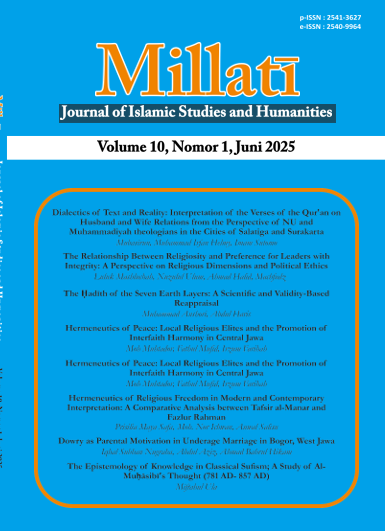Dialectics of Text and Reality: Interpretation of the Verses of the Qur’an on Husband and Wife Relations from the Perspective of NU and Muhammadiyah theologians in the Cities of Salatiga and Surakarta
DOI:
https://doi.org/10.18326/millati.v10i1.4071Keywords:
husband-wife relations , Qs. Al-Nisa: 34, interpretationAbstract
The fact that in society there are married women who work and have careers outside the home, raises debates in the interpretation of verses related to husband-wife relations. The purpose of this research is to reveal how NU and Muhammadiyah theologians interpret verses about husband-wife relations and the factors that influence these interpretations. The approach used in this research is a normative-sociological approach to highlight the views and ideas of NU and Muhammadiyah theologians about husband-wife relations. The use of a normative approach is to examine husband-wife relations in the verses of the Qur’an about husband-wife relations. Meanwhile, the sociological approach is used to see the views of theologians from Nahdlatul Ulama (NU) and Muhammadiyah circles about husband-wife relations as an interpretation of the verses of the Qur’an about husband-wife relations. For the purposes of analysis, the theory of Sociology of interpretation is used which refers to the view of Peter L Berger who states that the reality and knowledge that a person obtains are not given for free but are a dialect process between that person and the social reality that surrounds him which is then constructed into a text (interpretation). The research found that the interpretation of the NU and Muhammadiyah theologians of Salatiga and Surakarta regarding the shurah an-Nisa’[4];34 and al-Ahzab [33];33 did not have a problem with wives working and having careers outside the home as long as they obtained permission from their husbands.
References
Adz-Dzahabi, Muhammad Husain. At-Tafsir Wa Al-Mufassirun. Kairo: MaktabahWahdah, 1976.
Afriati, Intan. “Relasi Suami Isteri Dalam Al-Qur’an Ditinjau Dari Dimensi Pendidikan (Metode Tafsir Maudhu’i).” Gender Equality: International Journal of Child and Gender Studies 5, no. 2 (November 26th, 2019): 83–94. https://doi.org/10.22373/equality.v5i2.5599.
Al-Bantani, Nawawi. Marah Labid Li Kashf Ma’na al-Qur’an al-Majid. Surabaya: Dar al-Nasyr al Miṣriyyah, n.d.
Ar-Razi, Fakhruddin. Mafatih Al-Ghaib. Beirut: Dar Al-Fikr, 1977.
Basyar, Fahmi. “Relasi Suami Istri Dalam Keluarga Menurut Hukum Islam Dan Undang-Undang Nomor 1 Tahun 1974.” Istidlal: Jurnal Ekonomi Dan Hukum Islam 4, no. 2 (October 15, 2020): 138–50. https://doi.org/10.35316/istidlal.v4i2.269
Dewi, Putri, Arifka Budia Warman, Wardatun Nabilah, Siska Elesta Putri, and Mami Nofrianti. “Reinterpretasi Relasi Suami Istri Dalam Membangun Keharmonisan Rumah Tangga (Sebuah Pendekatan Kontekstual Terhadap QS. an-Nisaa’ (4): 34) | Islamika : Jurnal Ilmu-Ilmu Keislaman” 24, no. 02 (2024). https://ejournal.iainkerinci.ac.id/index.php/islamika/article/view/4499.
Dharma, Ferry. “Konstruksi Realitas Sosial:Pemikiran Peter L. Berger Tentang Kenyataan Sosial.” Kanal Ilmu Jurnal Komunikasi 7, no. 1 (2018). https://doi.org/10.21070/kanal.v6i2.101.
Fatahillah, Wilnan, and Muhammad Hariyadi. “Konsep Self Management Pasangan Suami Istri Dalam Mencegah KDRT Menurut Psikologi Dan Perspektif Al-Quran.” Coution: Journal Counseling and Education 5, no. 2 (November 15, 2024): 16–47. https://doi.org/10.47453/coution.v5i2.2736.
Downloads
Published
How to Cite
Issue
Section
License
Copyright (c) 2025 Mubasirun, Muhammad Irfan Helmy, Imam Sutomo

This work is licensed under a Creative Commons Attribution-ShareAlike 4.0 International License.







